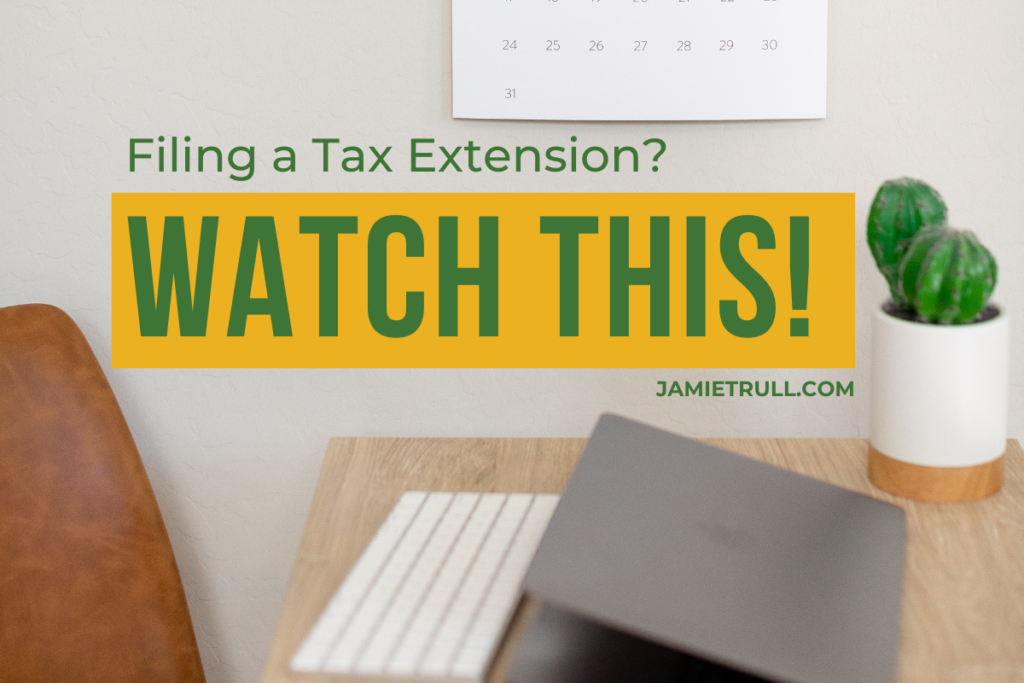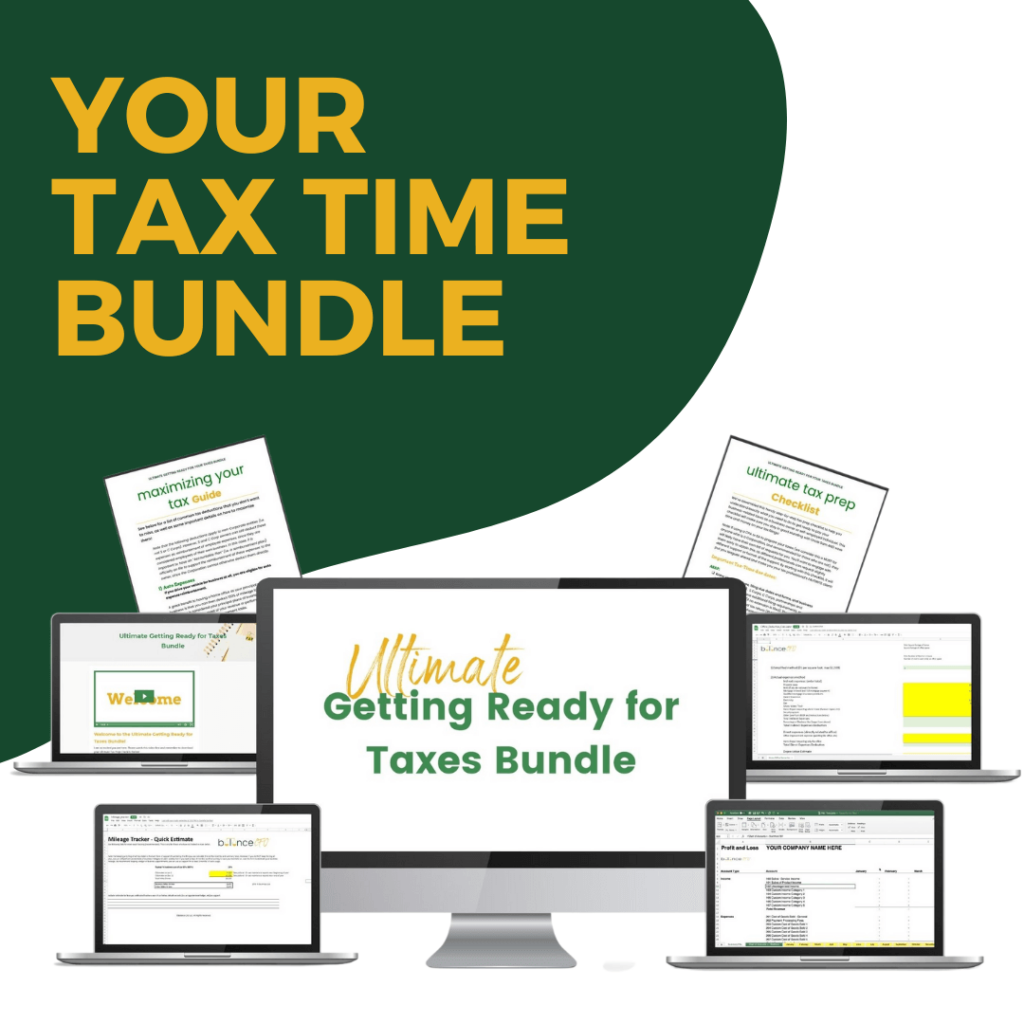
If you’re a business owner filing a tax extension for your federal taxes, you might be feeling the pressure as that deadline approaches, or maybe you’re just wondering what the next steps to take are. If so, this guide is for you.
We’ll walk you through everything you need to do and give you some tips on how to prevent penalties and interest. Plus, we’ll provide insights on how to file a tax extension step-by-step for the next year.
What Does Filing a Tax Extension Do?
A tax extension, often filed using Form 4868, typically gives you an extra six months to file your income tax extension.
For instance, if you are filing a personal 1040, the usual deadline is April 15th, but an extension pushes it to October 15th.
For business forms like the 1120S for an S Corp or 1065 for a partnership, the original deadline is March 15th, and an extension extends it to September 15th.
What a Tax Extension Doesn’t Do
One crucial point that many people overlook is that a tax extension only gives you more time to file your return, not to pay any taxes owed.
This means if you file a tax extension but owe federal taxes, you could still face penalties and interest on the unpaid amount.
Estimating Your Tax Owed
When you file a tax extension, it’s essential to estimate how much tax you might owe and pay that amount when you file for the extension.
You might wonder how to estimate this without having completed your taxes.
The IRS expects you to make a reasonable estimate. Some people choose to overpay slightly to cover any discrepancies, which can help avoid penalties and interest.
Ensure that your tax payment is made when you file for the extension to avoid penalties and interest.
Penalties and Interest When Filing A Tax Extension
If you owe taxes and delay filing until the tax extension filing deadline, you’ll incur penalties and interest.
The IRS charges 0.5% of the unpaid amount every month after April 15th, up to a maximum of 25% of the total owed. Additionally, interest accrues daily on any unpaid amount, compounding your debt quickly.
Therefore, it’s in your best interest to file as soon as possible to minimize these charges.
Preparing to File Your Taxes
Before filing your taxes, ensure your documents and books are organized. Accurate and up-to-date bookkeeping is crucial, whether you’re handling your taxes yourself or outsourcing to a professional.
Here are the steps to get organized:
- Bookkeeping: Use a reliable bookkeeping software like QuickBooks Online, which integrates with your bank and pulls in all transactions. For simpler business models, a P&L (Profit and Loss) worksheet can be sufficient. Be sure to use my links above for the best partner offers on Quickbooks Online and my P&L Template and Dashboard.
- Deductions: Ensure you’re claiming all possible deductions. Business owners, solopreneurs, and contractors often miss out on deductions like mileage, home office, cell phone, and internet expenses. Learn more about tax deductions with my free guide here.
- Reconciliation: Verify that your records match your bank statements. Reconcile your transactions to ensure nothing is missing or inaccurate.
- Documentation: Keep all relevant documentation organized.
This could include receipts, invoices, and other financial records. Proper documentation is crucial if you’re ever audited by the IRS.
Check out my video here about receipt organization and my favorite platform to help me stay organized in my business.
Common Tax Deductions
Understanding what qualifies as a deduction can significantly reduce your tax bill. According to the IRS, a deductible expense must be ordinary and necessary for your business.
Ordinary expenses are common in your line of business, while necessary expenses are helpful and appropriate. Some common deductions include:
- Home Office Deduction: If you use part of your home exclusively for business, you can deduct related expenses.
- Mileage: Business-related travel can be deducted at the standard mileage rate.
- Internet and Phone: A portion of your internet and phone expenses can be deducted if used for business purposes.
These deductions can significantly reduce your income tax liability.
If your numbers are a mess, I’ve got you! This is all you’ll need to get your business finances ready for taxes…without missing deadlines or deductions!
The Ultimate Getting Ready for Taxes Bundle
- Comprehensive Tax Prep Checklist + Guide to Maximizing Your Tax Deductions
- Six Easily Digestible Video Lessons
- High-Value Plug-and-Play Templates
- Plus A Bonus Walkthrough on How to File a Free Tax Extension

Get prepared early for your taxes and leave filing a tax extension behind with our Ultimate Getting Ready For Taxes Bundle!
Using Bookkeeping Software
Bookkeeping software like QuickBooks Online can streamline your financial management. It integrates with your bank and categorizes your transactions automatically.
For those with simpler needs, a P&L worksheet can also be effective. This helps you track your income and expenses, ensuring you have accurate records for tax purposes.
Plus, use my partner link for Quickbooks! You can grab the best partner promo I have seen out there!
Reconciliation
Reconciliation involves comparing your bank statements with your bookkeeping records to ensure accuracy. This process helps identify any discrepancies and ensures that your financial statements are complete.
Regular reconciliation can prevent errors and help you catch potential issues early.
Tax Return Documentation
Keeping detailed records is essential. Store your receipts, invoices, and other financial documents in an organized manner.
Digital tools can help you scan and store documents electronically, making it easier to retrieve them when needed. Proper documentation supports your deductions and can protect you in case of an audit.
Learn more about how I organize my business finances here.
Ensure that all tax extension information is also well-documented and easily accessible.
How To Avoid Filing A Tax Extension In The Future
To avoid needing an extension in the future, maintain organized financial records throughout the year.
Consistent bookkeeping and timely financial reviews can help you stay on top of your finances. Not to mention it will help you prepare for tax season without the last-minute scramble.
Consider watching workshops and tutorials on financial organization to enhance your skills.
Tips To Help You File Your Taxes On Time
- File Early: The earlier you file, the less you’ll owe in penalties and interest.
- Estimate Carefully: Make a reasonable estimate of your tax liability when filing for an extension. Learn more about how to pay quarterly estimated taxes here.
- Stay Organized: Keep your financial records in order to simplify the tax filing process.
By following these steps and staying organized, you can minimize the stress of tax season. With the added benefit of avoiding unnecessary penalties and interest.
For more detailed guidance, check out our related videos and resources on tax extensions and financial organization.
Final Takeaways For Filing a Tax Extension
Filing a tax extension can provide much-needed time to get your finances in order.
However, it doesn’t extend your payment deadline.
Filing an IRS tax extension typically involves completing IRS Form 4868. By estimating your tax liability, staying organized, and using bookkeeping tools, you can minimize penalties and interest.
The IRS tax extension provides additional time to file your return but does not extend the payment deadline.
Remember, the goal is to avoid needing an extension in the future by keeping your business finances organized year-round.
If you are self-employed and filing taxes be sure to check out why I DON’T recommend QuickBooks Self Employed in this article!
Video Transcript:
Please note that the following is a direct transcript and has not been edited for errors or omissions. It is a verbatim representation of the spoken words and may include colloquial language, grammatical errors, or other inconsistencies. We have chosen to provide the transcript in its raw form to preserve the authenticity of the conversation. We recommend cross-referencing with the original audio or video source for complete accuracy.
If you’re a business owner who filed a tax extension, you might be feeling the pressure as that deadline approaches. Or maybe you’re just wondering what the next steps to take are. If so, this video is for you. I’m going to walk you through everything that you need to do. And give you some tips on how to prevent penalties and interest.
And if you want to know exactly how to file a tax extension step by step for next year, I’m going to link a video where I do a full step-by-step of the process from start to finish. First off, let’s talk about what a tax extension does and doesn’t do when it comes to your tax return. Now, a tax extension is typically going to give you an extra six months to actually file your tax return.
Okay. So if you were filing a personal 1040, typically the deadline is six months. April 15th, but doing a tax extension gives you until October 15th. And if you were filing an 1120S for an S corp or maybe a 1065 for a partnership, those were actually due March 15th. which means you have until September 15th. if you did an extension for them.
Now, the most important thing to know about tax extensions that a lot of people still don’t realize. Is the fact that when you file that tax extension, sure, you get extra time to file. file the return, but you don’t get extra time to pay. So just because you extended your 1040 doesn’t mean that you won’t have penalties and interest if you end up owing.
So really what you need to be doing when you file that tax extension? Making sure to pay an estimate of what tax you think you owe. Now for a lot of people, they’re wondering, “how in the world am I supposed to know how much I owe? I haven’t done my taxes yet.” And that’s That’s the rub, right? That is the circular logic of it all. but the IRS does want you to estimate the amount that you’re going to owe.
A lot of people tend to just overpay a little bit more than they think they might actually owe. Just in case. So depending on your risk tolerance and how averse you are to penalties and interest, you might choose to do the same thing. Now.
If you do expect that you’re going to owe taxes when you do file your return. You’re probably not going to want to wait.
That extension due date. Okay? Because you are being charged each and every month. That amount is outstanding. And the IRS will charge you 0.5 percent of the total balance not paid as of April 15th. Every single month up to a maximum of 25 percent of the total amount owed. So that can rack up very, very quickly.
So the quicker that you actually file that return, The better. Not only that! Any unpaid amounts will accrue interest as well. And it’s getting compounded daily. So you’re gonna want to make those payments as soon as you possibly can to make sure that those interests and penalties do not start racking up on you.
Now, before you file those taxes, though, there are a few things that you’re gonna want to make sure that you have The first thing is that you want to make sure those tax documents and books are
[00:03:00] organized. So you want to make sure to keep your bookkeeping up to date. That you aren’t missing anything important. And you want to organize enough to access all information you will need for that tax return.
So whether you’re doing your taxes yourself or you’re outsourcing to someone, which I highly recommend, especially for business owners, you’re going to want to make sure that you have all the information you need at your fingertips. And the second thing you want to do, which is related. Make sure you’re not missing out on any deductions. That you’re getting all the deductions that you are entitled to.
If you are a business owner, a solopreneur, a contractor, anything like that. You have additional deductions that you may be entitled to that you might not even be aware of. So don’t forget those important things like mileage, potentially the home office deduction, even a portion of your cell phone and internet can be deductible to your business.
So don’t miss out on those important deductions. They can help reduce your overall tax bill, which is the goal.
The biggest thing to remember when it comes to figuring out what are actual deductions and write-offs in your business is the IRS definition. So the IRS definition of a deduction is something that is ordinary and necessary in your business.
Now, importantly, ordinary is just something that normally in your line of business, Somebody might have that as an expense and necessary. Thankfully doesn’t mean it actually is something you must have. It just again means it’s something that’s fairly normal for somebody to have as an expense in your line of business.
Okay. So it does need to be related to your line of business. It can’t be something completely out of left field, but as long as that is the case, it’s probably ordinary and normal. So what steps to take to stay organized with everything all over the place? How will you organize quickly?
Well, I highly recommend either using something like a bookkeeping software, maybe something like QuickBooks Online, that can integrate with your bank that you’re using and
pull in all the different transactions that you have, Or if you have a fairly simple business model, a very simple structure, maybe you’re a 1099 contractor, solopreneur, you could even use a P& L worksheet similar to the one that I have.
And that one is going to help you create your profit and loss. I generally don’t recommend just keeping a laundry list of expenses because it’s really easy to miss things and you’re not going to really be able to see much important information about your business to help you make decisions. So I do recommend having an actual profit and loss that you can use both for tax purposes, but also to help inform your business and understand how your business is performing.
Down below, I’m going to put my link both for QuickBooks Online. I have a great link that will save you money for a full year plus a free trial, which is a lot better than what you can get directly from QuickBooks. And I’m also going to link you to my profit and loss template. If having an ongoing subscription software is not right for you right now in your business, then perhaps
this profit and loss statement that you can buy one time and use ongoing will be the perfect fit for you.
And the second thing that I recommend doing to get things in order to make sure that everything is as it should be is once you have all of your documents together, all of your books together, I do recommend doing some type of reconciliation to make sure you’re not missing anything. So that might look like a reconciliation you do within your software to compare the bank statement to what the actual software has recorded, right?
Or compare maybe your Stripe sales to the income on your P&L. You do want to make sure that you’re doing some checks to make sure that your documents are complete and accurate. And the last thing you’re going to want to do, and if you’ve watched this channel at all, if not, why not subscribe, but if you’ve watched this channel at all, you know, I talk a lot about documentation, so make sure to keep that documentation, right?
You can again, keep it in a spreadsheet, keep it in a folder on your computer, take pictures with your phone, upload it into your software. There’s
lots of different ways to get organized. I have other videos on the topic of getting organized with your receipts. But you definitely want to make sure to have that documentation. For if, and when, you’re down the line.
You could potentially be audited by the IRS. Hopefully it doesn’t happen, but it happens a lot. And so we need to prepare, just in case. So now that you know what to do, if you filed an extension this year, we need to make sure that you don’t need to file an extension going forward. And that means getting your business finances.
organized. The best way to do that is to make sure that you have a proper bookkeeping system in place all year long so that you don’t have to scramble for taxes. And if you want to know how to do that, then definitely watch my full workshop. Which is up on the screen right now so that you can get your finances organized for 2024 and beyond.
Thanks for watching. If you liked this video, make sure to hit the like button, subscribe and share on social media, and I’ll see you next time.
